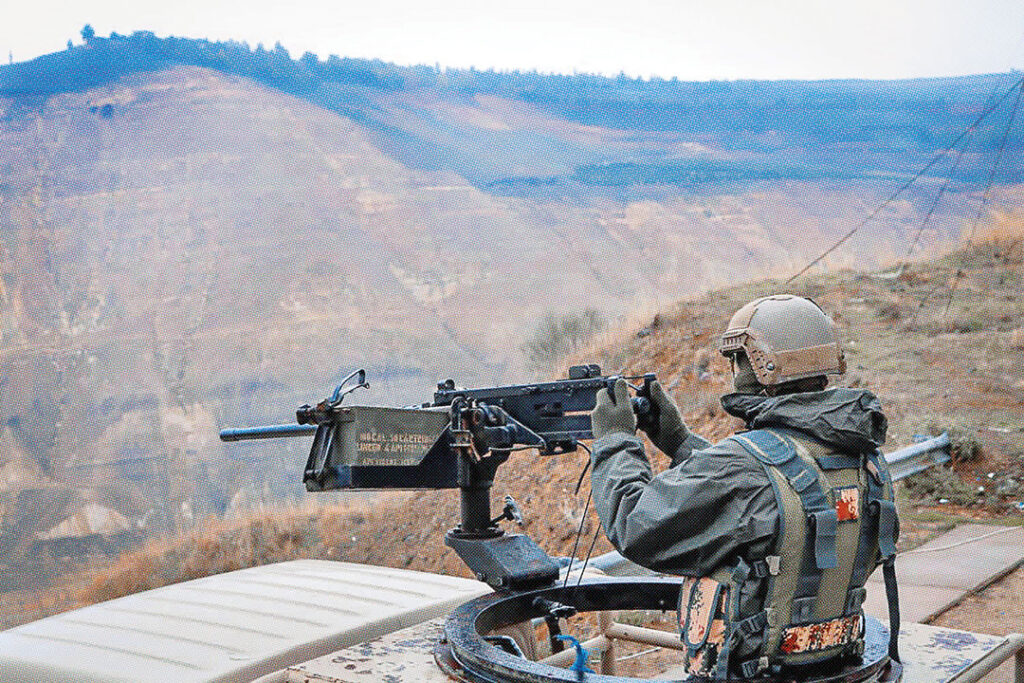UNIPATH STAFF
Terrorists exploit border gaps far from the eyes of the authorities to infiltrate, smuggle weapons, and undermine security and stability. Inadequate control over the Iraqi-Syrian border led to incursions by Daesh into large areas of Iraq in 2014. Therefore, countries of the region are keen to upgrade border security and thwart smuggling and terrorism attempts. Unipath interviewed Staff Brig. Gen. Ahmed Hisham Khleifat, director of Border Security in the Jordan Armed Forces, to talk about the challenges and missions in securing borders.
UNIPATH: What challenges do the border forces face?
Brig. Gen. Ahmed: Jordan’s borders face several challenges because they are at the center of several hot spots, particularly at the eastern and northern borders and because of the security-related unrest and conflicts there. The most prominent challenges we face are:
- The length of the Jordanian border (1,675 kilometers), including the northern and eastern borders (450 kilometers). This is a great length that requires significant human, operational and technical effort.
- The diversity of terrain. The border region contains geological folds, especially in the North, and this undulating ground represents a major challenge for surveillance cameras and requires significant human support to cover blind spots.
- Balancing humanitarian and national security demands. The large influx of refugees over a short period of time was a significant challenge for our forces. The difficulty with refugees is the need to provide humanitarian assistance while maintaining Jordan’s security. To distinguish between refugees who need our care and those who pose a security risk, our forces required a lot of training and support from human rights and international organizations.
- Infiltration and smuggling. To this day our borders in general, and the northern and eastern borders in particular, are subject to diverse attempts to infiltrate and smuggle people, vehicles, animals and, recently, drones.
- Syrian Army cooperation and facilitation of smuggling. Despite occasional cooperation with the Syrian regime’s forces to stem smuggling on our mutual border, some Syrian troops collaborate with smugglers to our detriment. Another challenge is the presence of militias and terrorist groups on parts of the border.
- Drones. Another major challenge is that some smugglers have honed their methods by using drones for multiple purposes such as transport and reconnaissance.
UNIPATH: How do you combat terrorist threats from the border zone?
Brig. Gen. Ahmed: The emergence of terrorists at the border is undoubtedly the result of unrest and conflicts, especially in Syria and Iraq. However, to combat these groups, we rely on our strengths, the most important of which are:
- Political stability and internal solidarity in the Hashemite Kingdom of Jordan.
- The strength of Jordanian participation in the international coalition to combat terrorism.
- Sophisticated and modern equipment and devices to help border control.
- Qualified and trained personnel capable of addressing any threat.
- Ongoing coordination involving the Armed Forces, security agencies, ministries and public institutions at the border.
- Written rules of engagement and governing regulations for all security agencies within the jurisdiction. Recently, the rules of engagement were changed and tightened because of an increase in intruders and smugglers at the border. These restrictions have succeeded in reducing infiltration and smuggling.
- Jordanian adherence to international agreements related to border security and prevention of nonconventional weapons proliferation.
UNIPATH: Discuss the use of modern technology in securing the border, particularly in areas suffering from unrest.
Brig. Gen. Ahmed: The Armed Forces are always striving to modernize, develop and supply all units and formations with the latest equipment to increase operational effectiveness and maintain high combat readiness. Without a doubt, the border security system is an important link to the national security system, as the Jordan Armed Forces-Arab Army General Command is focused on supporting border guard units and supplying them with the latest equipment to increase operational performance and intelligence. The Jordan Border Security system was installed in phases, starting with the northern and eastern borders, then the southern border. Other phases will include every border, God willing, and they will be monitored as part of the advanced system 24 hours a day.
UNIPATH: How do you confront the drone threat to national security?
Brig. Gen. Ahmed: Drones are one of the latest threats we have faced and have become a major tool for smuggling at the border. This has increased the challenges we face, some of which have been monitored by the border security system and dealt with by available means, while the General Command has directed specialized departments in this field to take preemptive action to deter the threat of drones.
UNIPATH: How have international partnerships aided border security?
Brig. Gen. Ahmed: Border security is a joint responsibility between Jordan and neighboring states, and terrorism must be combated by all friendly and allied states. However, coordination is not at the required level, particularly with Iraq and Syria, despite the existence of joint agreements with these states. Liaison officers between Jordan and neighboring countries encourage the exchange of information regarding counterterrorism and border security. I would like to point out that the United Nations Office of Counter-Terrorism held a regional border security conference in Amman in March 2022. In addition to Jordan, Egypt, Iraq, Saudi Arabia, Turkey and Libya participated. Conference attendees recommended stronger coordination among these states to confront extremism and terrorism and increased support — including better equipment — for countries struggling with these problems.

